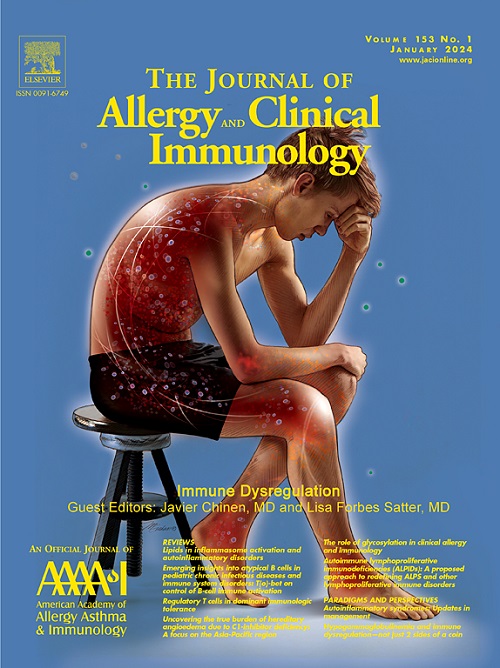MAP4K1杂合缺失通过放大T细胞反应导致免疫失调。
IF 11.2
1区 医学
Q1 ALLERGY
引用次数: 0
摘要
map4k1编码造血祖激酶1 (HPK1), HPK1是一种丝氨酸/苏氨酸激酶,通过磷酸化衔接蛋白SLP-76和Gads负调控T细胞受体(TCR)信号。虽然常见的MAP4K1变异与多基因免疫介导的疾病有关,但罕见的种系变异对人类免疫的影响仍不清楚。目的探讨先天性免疫缺陷(IEI)患者HPK1缺乏的免疫学和功能后果。方法通过基因组连锁分析和外显子组测序来鉴定IEI患者的疾病相关变异。对患者源性淋巴细胞进行免疫分型、rna测序和功能分析,并在原代T细胞中辅以crispr - cas9介导的MAP4K1破坏和校正。结果在两种表现出不同免疫失调症状的患者中发现了异合子MAP4K1功能丧失变异,包括复发性发热、炎症性关节炎、ebv相关并发症和肾炎。这些变异导致HPK1蛋白水平降低和SLP-76Ser376磷酸化。虽然淋巴细胞的发育在很大程度上得到了保留,但hpk1缺陷个体的T细胞对TCR刺激表现出高反应性,其特征是促炎细胞因子的分泌增加,尤其是干扰素-γ (IFN-γ)和肿瘤坏死因子(TNF)。crispr介导的基因敲除重现,变异校正部分逆转了这种表型。受刺激的CD4+ T细胞的转录组学分析进一步揭示了免疫信号通路(包括NF-κB、JAK/STAT和ap -1)的上调,以及多种T细胞因子的表达增加,这与hpk1缺陷个体中TCR信号和T细胞反应的增强一致。结论由MAP4K1杂合缺失引起的hpk1缺陷是一种新的免疫失调单基因原因。增加的T细胞活化和促炎细胞因子的产生与疾病的发病机制有关。本文章由计算机程序翻译,如有差异,请以英文原文为准。

Heterozygous loss of MAP4K1 causes immune dysregulation by amplifying T-cell responses
Background
MAP4K1 encodes hematopoietic progenitor kinase 1 (HPK1), a serine/threonine kinase that negatively regulates T-cell receptor signaling via phosphorylation of the adaptor proteins SLP-76 (Src homology 2 domain-containing leukocyte protein of 76 kDa) and Gads. While common MAP4K1 variants have been implicated in polygenic immune-mediated diseases, the impact of rare germline variants on human immunity remains undefined.
Objective
We investigated the immunologic and functional consequences of HPK1 deficiency in individuals with suspected inborn errors of immunity.
Methods
We performed genomic linkage analysis and exome sequencing to identify disease-associated variants in patients with inborn errors of immunity. Immunophenotyping, RNA sequencing, and functional assays were conducted on patient-derived lymphocytes, complemented by CRISPR-Cas9–mediated MAP4K1 disruption and correction in primary T cells.
Results
Heterozygous MAP4K1 loss-of-function variants were identified in two kindreds presenting with diverse immune dysregulatory symptoms, including recurrent fevers, inflammatory arthritis, Epstein-Barr virus–related complications, and nephritis. These variants led to reduced HPK1 protein levels and SLP-76Ser376 phosphorylation. While lymphocyte development was largely preserved, T cells from HPK1-deficient individuals displayed hyperresponsiveness to T-cell receptor stimulation, characterized by elevated secretion of proinflammatory cytokines, particularly IFN-γ and TNF. CRISPR-Cas9–mediated knockout recapitulated, and variant correction partially reversed this phenotype. Transcriptomic profiling of stimulated CD4+ T cells further revealed upregulation of immune signaling pathways—including NF-κB, JAK/STAT, and AP-1—as well as increased expression of multiple T-cell cytokines, consistent with enhanced T-cell receptor signaling and T-cell responses in HPK1-deficient individuals.
Conclusion
HPK1 deficiency, caused by heterozygous loss of MAP4K1, is a novel monogenic cause of immune dysregulation. Increased T-cell activation and proinflammatory cytokine production are implicated in disease pathogenesis.
求助全文
通过发布文献求助,成功后即可免费获取论文全文。
去求助
来源期刊
CiteScore
25.90
自引率
7.70%
发文量
1302
审稿时长
38 days
期刊介绍:
The Journal of Allergy and Clinical Immunology is a prestigious publication that features groundbreaking research in the fields of Allergy, Asthma, and Immunology. This influential journal publishes high-impact research papers that explore various topics, including asthma, food allergy, allergic rhinitis, atopic dermatitis, primary immune deficiencies, occupational and environmental allergy, and other allergic and immunologic diseases. The articles not only report on clinical trials and mechanistic studies but also provide insights into novel therapies, underlying mechanisms, and important discoveries that contribute to our understanding of these diseases. By sharing this valuable information, the journal aims to enhance the diagnosis and management of patients in the future.

 求助内容:
求助内容: 应助结果提醒方式:
应助结果提醒方式:


